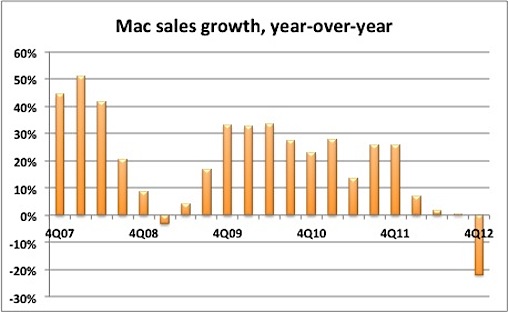Apple's Mac has been punished by shifting consumer tastes just as has the overall PC industry, data from the company's earnings statements show.
But in the end, Apple may not care.
"I think PC, and Mac, volumes will continue to shrink as this trend grows stronger," said Sameer Singh, an analyst at Tech-Thoughts. "But Apple is positioned well to take advantage of it."
Over the past four quarters, Mac sales gains have languished at 7% or less, and over the last three, at 2% or less. The worst was the fourth quarter of 2012, when Mac sales were down 22% compared to the same period the year prior.
Some of that has been Apple's own doing -- 2012's fourth quarter plummet, CEO Tim Cook explained in January, was due to the near-invisibility of the company's all-in-one iMac desktop -- but even the best of the past 12 months' results look paltry when juxtaposed against those of previous years.
In 2010 and 2011, total Mac sales were up 29% and 23%, respectively. Even in the depths of the Great Recession of 2008-2009, unit sales in the latter year were 13% higher than the one before.
But 2012's total Mac sales were down 4% from 2011.
It's not likely to get much better later today when Apple announces its first-quarter sales figures for the Mac, assuming the estimates of 57 analysts are on target. The median of their forecasts, approximately 4.1 million Macs, would represent a 2% increase over the same quarter last year.
That jibes with numbers from The NPD Group, which tracks U.S. retail sales, and which last week said Mac sales were flat in the first quarter.
Figuring out why Mac sales have gone soft was relatively easy for David Daoud of IDC. In an interview two weeks ago, he dissected what others called a "brutal" quarter for PC shipments.
"Apple's facing a very similar environment [to the PC industry in general]," Daoud said then.
According to IDC, the 14% decline in PC shipments was caused by a whole host of factors -- "a perfect storm," as Daoud put it -- including the failure of Microsoft's Windows 8 to attract consumers; a general saturation of PCs, especially in developed countries like the U.S.; the fact that PCs bought since 2008 or 2009 remain "good enough" for what consumers want out of a desktop or laptop, thus increasing the time between new purchases; and in some parts of the world, stagnant economic conditions.
All but Windows 8 would apply to Macs too.
Rather than purchase PCs or Macs, consumers have decided not to replace aging machines, analysts have opined, but instead have taken those dollars and spent them on other computing device -- tablets in particular as well as smartphones.
In other words, Apple's iPad is likely a big reason for the Mac's limp growth in 2012, just as it and the less-expensive tablets running Google's Android were among the causes of the even-larger drop in Windows PC sales.

Mac unit sales growth took a beating last year, best illustrated by the fourth quarter's 22% decline.





